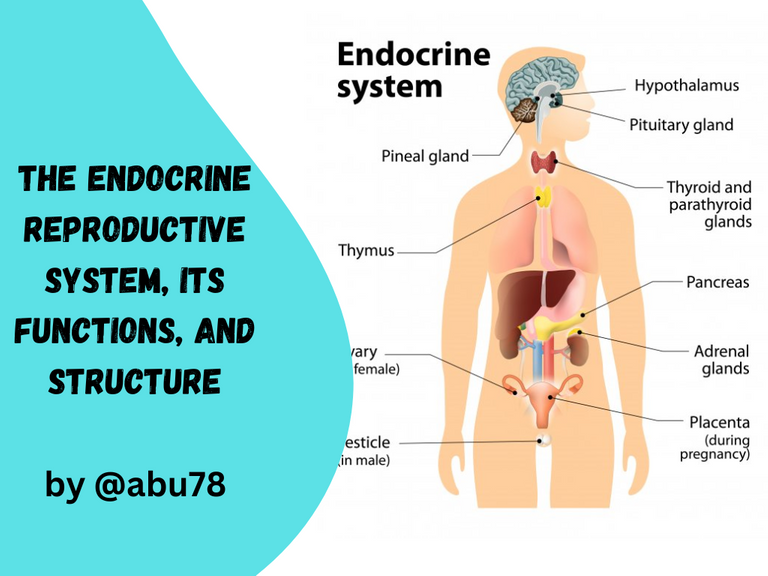The endocrine system, the structure, functions, and importance
Greetings to all and sundry on this platform once again. As a biochemistry student, today I did my research on "the endocrine system, the structure, functions, and importance" and decided to share it with you guys here. I hope that you will enjoy it and also learn from it. Stay tuned with me as I discuss this topic in my article.

The endocrine system is a complex system of glands and organs located throughout the body. Its primary role is to distribute hormones throughout the body, which are responsible for regulating a wide range of bodily functions. The endocrine system works in tandem with the nervous system, providing a balance between the two systems that ultimately helps maintain homeostasis in the body.
The endocrine system is made up of seven major glands, including the hypothalamus, the pituitary gland, the pineal gland, the thyroid gland, the parathyroid glands, the thymus gland, and the adrenal glands. Each of these glands has a specific role to play in the functioning of the endocrine system.
The hypothalamus is the primary regulator of the endocrine system. It is located in the brain and is responsible for releasing hormones that stimulate or inhibit the release of hormones from other glands. For example, the hypothalamus can stimulate the release of hormones from the pituitary gland, which in turn can stimulate the release of hormones from other glands.
The pituitary gland, located at the base of the brain, is one of the most important glands in the body. It is responsible for the production of hormones that regulate growth and development, as well as other bodily processes. Hormones produced by the pituitary gland include growth hormone (GH), thyroid-stimulating hormone (TSH), adrenocorticotropic hormone (ACTH), and follicle-stimulating hormone (FSH), amongst others.
The pineal gland, located in the brain, is responsible for the production of the hormone melatonin. Melatonin helps to regulate the body’s circadian rhythm, making sure that the body’s internal clock stays in sync with the environment.

The thyroid gland, located in the neck, is responsible for the production of hormones that regulate metabolism. These hormones, known as thyroid hormones, are responsible for regulating the body’s energy output, as well as its growth and development.
The parathyroid glands, located in the neck, are responsible for the production of the hormone parathyroid hormone (PTH). This hormone helps to regulate calcium levels in the blood, which ultimately helps to maintain healthy bones and teeth.
The thymus gland, located in the chest, is responsible for the production of hormones that regulate the immune system. These hormones help to stimulate the production of immune cells, which help to protect the body from disease and infection.
The adrenal glands, located above the kidneys, are responsible for the production of hormones that regulate stress levels in the body. These hormones, known as adrenaline and cortisol, play an important role in the body’s fight-or-flight response.
The importance of the endocrine system cannot be overstated. The hormones it produces play a critical role in regulating a wide range of bodily functions, from metabolism and growth and development to stress levels and immunity. A healthy endocrine system is essential for maintaining optimal health and well-being.
When it comes to maintaining a healthy endocrine system, diet, and lifestyle play a key role. Eating a balanced diet and getting regular exercise can help to keep the endocrine system functioning optimally. Additionally, avoiding toxins such as cigarettes, alcohol, and drugs can help to reduce the risk of endocrine disorders.
Finally, if you experience any symptoms that could be related to an endocrine disorder, such as fatigue, weight gain, or changes in mood, it is important to see your doctor. Early detection and treatment are key to managing endocrine disorders and restoring your health.
In conclusion, the endocrine system is a complex system of glands and organs located throughout the body. It is responsible for producing hormones that regulate a wide range of bodily functions, from metabolism and growth and development to stress levels and immunity. A healthy endocrine system is essential for maintaining optimal health and well-being. Eating a balanced diet, getting regular exercise, and avoiding toxins are all important for keeping the endocrine system functioning optimally. Additionally, if you experience any symptoms that could be related to an endocrine disorder, it is important to seek medical advice.
Reference 1
Reference 2
Reference 3
Reference 4
Reference 5

Thanks for your contribution to the STEMsocial community. Feel free to join us on discord to get to know the rest of us!
Please consider delegating to the @stemsocial account (85% of the curation rewards are returned).
Thanks for including @stemsocial as a beneficiary, which gives you stronger support.
Congratulations @abu78! You have completed the following achievement on the Hive blockchain And have been rewarded with New badge(s)
Your next target is to reach 10000 upvotes.
You can view your badges on your board and compare yourself to others in the Ranking
If you no longer want to receive notifications, reply to this comment with the word
STOPCheck out our last posts:
Support the HiveBuzz project. Vote for our proposal!
There is reasonable evidence that this article is machine-generated. Posting such content is considered fraud.
Fraud is discouraged by the community and may result in the account being Blacklisted.
Guide: Why and How People Abuse and Defraud
If you believe this comment is in error, please contact us in #appeals in Discord.